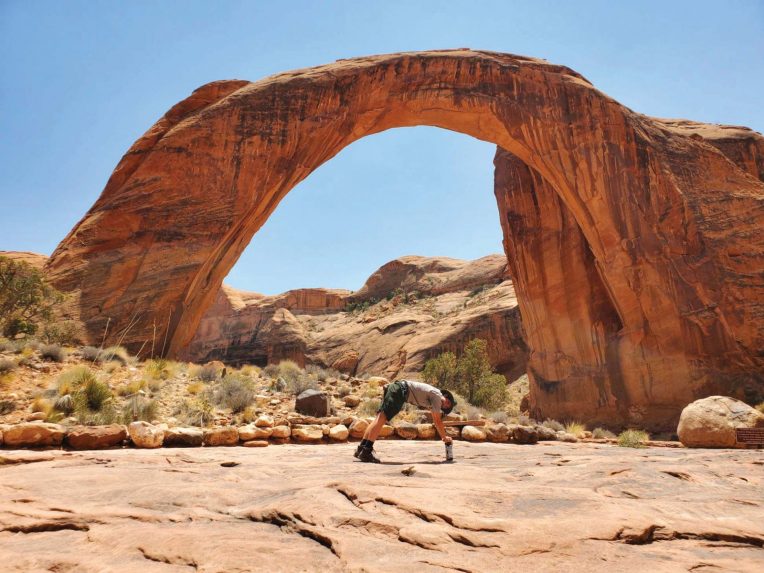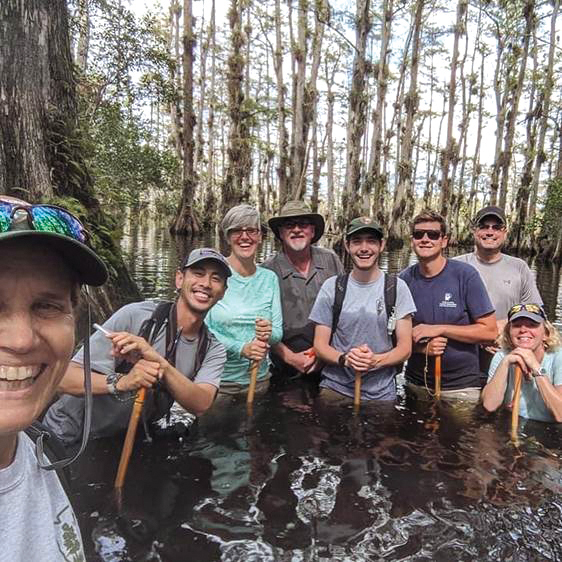Choosing Recreation and Park Administration (RPA) as a major was easy for Alex Harrison ’20. “I knew I wanted to be in a field that catered to giving people of all ages, walks of life, and backgrounds the best experiences that this world has to offer.”
Harrison shares his passion in his role as an Interpretive and Environmental Education Park Ranger with the National Park Service (NPS), a federal agency operating under the Department of the Interior. He will move to different national park units every six months for the first two years of his career before staying at one park long-term.
“Each park features different natural, historical, and cultural resources that our agency looks to preserve and protect for this and future generations,” Harrison explained, noting that learning about a variety of parks early in his career is an asset. His career started with an internship placement at Sleeping Bear Dunes National Lakeshore in northern Michigan, and he has since moved around to Missouri, Florida, and Arizona, currently residing in California.

In his role, Harrison’s focus is on working with visitors and students from various backgrounds and walks of life to help them understand why park resources are important and the continuous need of preservation efforts. “Students and visitors get to learn in some of the most beautiful places in America. Setting this stage and having our visitors and students interacting and being one with the resource immerses them into a more meaningful experience.”
These “meaningful experiences” are no ordinary days at the office. Harrison has been able to take visitors and students deeper into the parks through experiences such as trekking on snowshoes to learn about snow science and animal adaptations, hiking waist-deep through swamps among the alligators, pythons, and thousands of amazing plant species, and kayaking the Colorado River to educate visitors about boating safety and the low water issues affecting the Southwest.

In addition to providing these experiences, a key part of Harrison’s job is educating the park visitors. “Each park I have worked at recognizes and challenges visitors and students about hard topics and current events that are affecting that specific park. The challenging part about having these conversations is helping the visitor or student understand both sides and to hear both viewpoints that are being offered. Issues surrounding parks might involve wildlife management, climate change, invasive species, land development neighboring public lands, mining rights, low water issues, and visitor overcrowding and experience. It is our job to present unbiased facts and allow the visitor to form an opinion around that. This can be challenging to do, no matter the issue at hand.”
Harrison has continued to work through the coronavirus (COVID-19) pandemic. “We have made the necessary modifications to follow CDC safety guidelines and have worked to educate groups virtually. For example, during my time in Florida, we purchased iPads to be able to present virtual programming from the park right to the classroom. At each park I have been to, we have had to think creatively and on our feet.”

The COVID-19 pandemic changed work operations for Harrison and his colleagues, but it also changed things for the visitors. Overall, 2020 saw a 100 million drop in visitors across the entire National Park Service system from the prior year. As the pandemic continued and CDC guidance changed, visitation numbers have steadily increased. “When the pandemic initially started, many people visited their local, state, or national parks close to their communities,” Harrison explained. “The summer of 2021, we started to see more international travelers and visitors coming once again. We have also seen a rise in virtual visits in which visitors and students were able to attend a ranger program or classroom program from the ease of their mobile devices.
“Overall, the pandemic changed the way that people visited the parks in many ways. For example, when the pandemic first hit, we saw a jump in the number of people trying out a new personal hobby or activity like biking. Demand for bicycles skyrocketed during the first few months of the pandemic and continues today,” said Harrison. “While we saw a jump in people trying out new personal hobbies and activities, we also saw a drop across the rest of the recreation, sport, and tourism industry as venues, experiences, events, and large gatherings were shut down.
“National parks are great ways to get out and be able to safely recreate while enjoying the beauty of this country. The National Park Service has taken significant steps in ensuring a safe and fun environment for those who have visited and will continue to visit our parks during this pandemic.”
Harrison finds fulfillment in his job personally as well as professionally. “My favorite part about the job is, simply put, being able to wake up, walk out my door, and call the park I work at home,” said Harrison. “To be able to go out after work and climb some sand dunes or go catch and tag sharks as a part of work makes me grateful to be working in places that allow me personally to be living a fulfilling life.”
“To stand on a steep cliffside edge, to quietly peer out over a lake on a cold, dewy morning, or to watch a warm sunset hit the horizon behind snowcapped peaks, really puts everything into perspective. National parks are places for people to feel. They are places where objective truth and subjective truth can be observed and explored by each human alike. They are places to grieve from trauma or loss. They are places to try a new hobby or make lifelong memories. Each park I have worked has introduced me to new lifelong ranger friends, challenging opportunities, and fun experiences that have helped me grow personally and professionally. To both live and work in these places is what I love about this job.”
Illinois State University proved to be the perfect place for Harrison to pursue this dream: “The class sizes were ideal. The professors took the time to get to know me and help me grow as a student, person, and professional.”
“I would encourage current and future students to make connections early on during your time at ISU. RPA does a great job of connecting you with the top professionals in the industry. Do your part by reaching out to a professional who is in a role you’d like to be in one day and ask them how they got there. Learn what it takes to get to that job, whether it be obtaining certifications or learning professional development skills prior to graduation.”
Interested in learning more about opportunities in the School of Kinesiology and Recreation, and maybe finding the perfect major for you? Visit kinrec.illinoisstate.edu.


